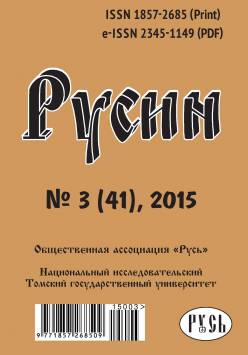The category of abstractedness in the russian and bulgarian languages: cognitive reflexes of formalisation
The article presents the results of a comparative analysis of the perception of words in the Russian and Bulgarian languages. The analysed words were opposed by the grammatical category of abstractedness. The leading method of research was the psycholinguistic behavioral experiments. The authors prove the thesis that the grammatical category of abstractedness in the Bulgarian language has a higher degree of formalisation compared with that in the Russian language, which influences the interpretation of words during the bimodal (audio-visual) perception: the rate of processing stimuli in Bulgarian is higher than in Russian. The results of the experiment led to the conclusion that there are differences in the pattern of cognitive processing of word meanings, characterised by different types of formalisation of semantic differences. These results are consistent with the theory about the influence of the information type on the cognitive processing of the sign in the multimodal perception, even in the circumstances when this information is out of the focus of voluntary attention. The findings are important for understanding the cognitive consequences of varying the ways of formal marking of the semantically similar categories in cognate languages.
Keywords
русский язык,
болгарский язык,
категория абстрактности,
психолингвистический эксперимент,
поведенческий эксперимент,
бимодальное восприятие,
Russian language,
Bulgarian language,
category of abstractedness,
psycholinguistic experiment,
behavioral experiment,
bimodal perception,
multimodal perceptionAuthors
| Rezanova Zoya | Tomsk State University | rezanovazi@mai1.ru |
| Nekrasova Elena | Tomsk State University | nekrasovaed@yandex.ru |
Всего: 2
References
Ананьев Б.Г. Теория ощущений. Л.: ЛГУ, 1961. 456 с.
Веккер Л.М. Психические процессы. Л.: ЛГУ, 1974. Т. 1. 312 с.
Величковский Б.М., Зинченко В.П., ЛурияА.Р. Психология восприятия. М.: Изд-во МГУ, 1973. 247 с.
Данц А.Д. Зрительные и слуховые влияния на определение изменения временной частоты // Экспериментальная психология. 2011. Т. 4, № 2. С. 48-61.
Князев Ю.П. Маркированность и немаркированность в морфологии: исходная идея и ее трансформации // Проблемы грамматики и типологии: Сб. ст. памяти В.П. Недялкова (1928-2009). М.: Знак, 2010. С. 120-127.
Колбенева М.Г., Александров Ю.И. Органы чувств, эмоции и прилагательные русского языка: Лингво-психологический словарь. Ин-т психологии РАН. М.: Языки славянских культур, 2010. 368 с.
Логвиненко А.Д. Чувственные основы восприятия пространства. М.: Изд-во МГУ, 1985. 345 с.
Лурия А.Р. Ощущения и восприятие. М.: Изд-во МГУ, 1975. 535 с.
Ляшевская О.Н., Шаров С.А. Частотный словарь современного русского языка (на материалах Национального корпуса русского языка). М.: Азбуковник, 2009. 1112 с.
Маслов Ю.С. Очерк Болгарской грамматики. М.: Изд-во лит-ры на иностран. языках, 1956. 292 с.
Некрасова Е.Д. Влияние межмодального конфликта на восприятие вербальных стимулов // Вестник Томского государственного университета. 2015. № 392. С. 21-26.
Некрасова Е.Д. Взаимозависимость модальной семантики слова и перцептивного канала предъявления информации // Вестник Томского государственного университета. 2016. № 402. С. 10-16.
Резанова З.И., Некрасова Е.Д. Влияние грамматической категории рода на бимодальное восприятие имен существительных болгарского языка // Русин. 2015. № 3. С. 241-255.
Рубинштейн С.П. Основы общей психологии. М.: Изд-во МГУ, 1946. 311 с.
Русская грамматика. Академия наук СССР. Ин-т рус. яз. М.: Наука, 1980. Т. 1. 784 с.
Фаликман М.В. Прайминг и прайминг-эффекты (эффекты предшествования) // The virtual CogLab. URL: http://old.virtualcoglab.ru/ projects/priming.htmllfnf (дата обращения: 12.04.2016).
Cermak L.S., Talbot N., Chandler K. et al. The perceptual priming phenomenon in amnesia // Neuropsychologia. 1985. Vol. 23 (5). P. 615-622. DOI: 10.1016/0028-3932(85)90063-6
Clark J.M., Paivio A. Extensions of the Paivio, Yuille, and Madigan (1968) norms // Behavior Research Methods, Instruments, & Computers. 2006. № 36 (3). P. 371-383.
Cortese M.J., FugettA. Imageability ratings for 3,000 monosyllabic words // Behavior Research Methods, Instruments, & Computers. 2004. № 36 (3). P. 384-387.
Dehaene S., Naccache L, Le Clec'h G. et al. Imaging unconscious semantic priming // Nature. 1998. Vol. 395 (6702). P. 597-600. DOI: 10.1038/26967
Evans V, Benjamin K. Bergen, Jorg Zinken. The Cognitive Linguistic Reader. London, Oacville, Equinox Publishing Ltd., 2007. 975 p.
Palmer F.R. Mood and modality. Cambridge: Cambridge Univ. Press, 1986. 258 p.
Pecher D. Verifying different-modality properties for con-ceprs produces switching costs // Psychological science. 2003. Vol. 14, № 2. P. 119-124.
Pecher D. Sensorimotor simulations underlie conceptual representations: Modality-specific effects of prior activation // Psychonomic Bulletin & Review. 2004. Vol. 11 (1). P. 164-167.
Rezanova Z.I., Nekrasova E.D., Temnikova I.G. Gender-Marked Metaphors: Influence of Grammatical Gender and Frequency on Referential Choice of Metaphorical Name of the Person in the Russian Language // Procedia - Social and Behavioral Sciences. 2015. Vol. 200. P. 135-141. DOI: 10.1016/j.sbspro.2015.08.033
Simov K., Osenova P., Kolkovska S. et al. A language resources infrastructure for Bulgarian // Proceedings of Language Resources and Evaluation Conference. Lisbon, Portugal, 2004. P. 1685-1688.
_9_2016_1476371722.jpg)
